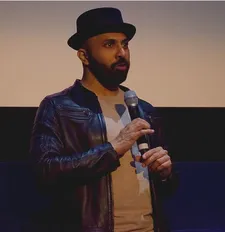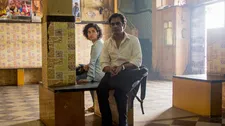 |
| Nawazuddin Siddiqui as Rafi Photo: Joe D'Souza. © 2018 Tiwari's Ghost, LLC. All Rights Reserved |
The Lunchbox director Ritesh Batra - who now lives in New York and has recently directed English language films The Sense Of An Ending and Our Souls At Night - returns to his home country to use the bustling streets of Mumbai as the backdrop for Photograph, a romantic drama that crosses the class divide.
It stars Nawazuddin Siddiqui - who was also in The Lunchbox - as Rafi, a street photographer who strikes up an unlikely friendship with younger middle-class Miloni (Sanya Malhotra) he snaps one day. Using her photograph in a bid to convince his gran (Farrukh Jaffar) he has a girlfriend, he soon finds himself begging the younger woman to join his charade when his gran decides to visit. Soon, the faux romance begins to show signs of blossoming into the real thing.
 |
| Sanya Malhotra (centre) as Miloni Photo: Joe D'Souza. © 2018 Tiwari's Ghost, LLC. All Rights Reserved |
Chatting to Ritesh Batra after his film had its UK premiere at Edinburgh International Film Festival he proves to be as softly spoken and measured as his films as he considers the return to his homeland.
He said: "It was a great reunion for me to, to get back to work with all the same people who had worked on The Lunchbox, the costume designer, the production designer - the same crew essentially. So it was a very nice reunion and with many of the actors, too. I had a lot of fun making the movie."
The return to Mumbai also gave him more creative control.
He adds: "That's something that you always want to get to in your career. We raised the money for this movie from international pre-sales, so we hadn't taken any money from the local market, so there was no pressure to put something in the movie or change the ending - some of the things that I had to deal with in The Lunchbox. Every movie you make, you learn something more about yourself and about the business."
He says its tough to catalogue everything he learned, but says: "One thing I definitely learned was that I enjoy directing my own writing, more so than directing other people's writing. I've been very fortunate to work on great projects, but I do plan to keep directing my own writing. It's something I have become very particular about. Because, you spend in this business a lot of time reading things, if you're a director, but now I've just stopped doing and I'm using the time to write."
 |
| Siddiqui and Dadi (Farrukh Jaffar) Photo: Joe D'Souza. © 2018 Tiwari's Ghost, LLC. All Rights Reserved |
He adds: "The more you work, the more you learn about yourself. So, what happens to me generally is that the first scene I write, that ends up being what the movie is really about and I work from there. So the last scene in the movie was the first one I wrote, and I didn't know it was going to be the last scene then, but I worked backwards from there and forwards from there. I had a sense that this is a somewhat poor guy and he's a somewhat rich girl and somewhere in the writing process, it ended up being the last scene."
Although many might view the film as a comfortably old-fashioned will they/won't they romance, Batra also points out "it's a fantasy."
He adds: "Because they are from two different social classes, usually the interaction would be, 'How much is that?' and, 'Here's the change.' So for me, when I was writing it, it was just about how can we sustain the length of the movie between two people who, typically, would never spend time together, and who are getting to know each other. Once you make something and it's out there, is what's nice is that it can be something else to everybody, something particular. It's nice that people can take it and feel something different about it.
He says that the class aspect of the film was almost inevitable because its an inherent part of life in India, noting that even in The Lunchbox a blue collar worker is trying to pass off as white collar.
"In this movie it's more at the forefront because the characters come from different classes," he says. "But it's hard to, I think, make a truthful movie about India and not have that represented in some way, big or small because it's just part of daily life. There's a full-time maid living in every middle-class house and she is part of the family and yet not, sleeping on the kitchen floor etc. That is such a big part of Indian life, for better or for worse, so there's no way to escape it."
 |
| Ritesh Batra at the EIFF Q&A for the film Photo: courtesy of the Edinburgh International Film Festival |
Although the interiors of Rafi and Miloni's homes were shot on a sound stage, much of Photograph was filmed on location in the busy and hot streets of Mumbai, which presented its own set of challenges.
"I shot there five or six years before for The Lunchbox, but I noticed it was much more crowded, and we shot at the same time of the year but it was much, much hotter," he says.
"So, this whole climate change? I could physically feel it. I was a lot more exhausted, much sooner and the same goes for everybody else. You know, the funny thing is that most Mumbai movies, Bollywood movies, don't shoot in Mumbai. They shoot either in sound stages or London, where it's cooler. There's a reason for that. But the movie also got a lot from shooting there - we couldn't have shot anywhere else."
Despite the ebb and flow of people in the street scenes, Batra's latest is an intimate movie, where silences are as important as dialogue, especially for Miloni's character, who is reserved from the off.
"What happened with Miloni's character is that there are other people speaking for her a lot at home and stuff and she doesn't really have a voice," explains Batra "It just made sense to take away her dialogue. The actor Sanya is very good. She can do a lot without words and I think it helps the movie a lot. Both her and the character are very observant on picking up on little details. Those people are usually the quieter ones, so it made sense to take away a lot of her words. I don't think we could have done it without her playing that part, it would have probably needed more lines."
He says he's enjoyed the "no boss" aspect of having his latest film financed from pre-sales - when the film is sold to distributors at an early stage before it is made.
 |
| Sanya Malhotra and Nawazuddin Siddiqui in Photograph Photo: Joe D'Souza. © 2018 Tiwari's Ghost, LLC. All Rights Reserved |
He adds: "But it depends on the scale and size of the movie. I don't have a preference really. It's all about getting things made, so I'm all for getting the movie made."
Although Batra has no problem with streaming services - after all, he was a Netflix director for hire on Our Souls At Night - he still counts himself as lucky in terms of his debut The Lunchbox.
He says: "The Lunchbox came out in 2013 and, at that time, there was not a big wave of streaming but I think that if the movie had gone straight to a streaming service - been acquired or made by one - it would have got lost and I wouldn't have had a career right now to the extent that I do.
"I'm really thankful to that movie because I think there was something about the best distributors in every country picking it up and the theatrical aspect of that really built a halo around the movie. It showcased it in a way that has been great for my career, so I was very lucky.
"But I think somebody starting out now, it's not been that many years, only five or six, but their first film is most likely going to end up on a streaming service. I think there's something about the theatrical showcasing of a movie that puts a spotlight on it - sometimes that's good for a movie and sometimes it's bad. But I feel that if The Lunchbox had come out now, it wouldn't have garnered the acclaim it did then because a small movie like that would have got lost in the tubes.
"I feel like people's attention is split between so many different things, so theatrical showcasing brings thing to the fore.
"If I was starting my career now, I would be much more worried about standing out and being able to make a mark. I think it's hard and, at the same time, the only viable career now is not just film, there's also episodic now, which there wasn't back then.
And Batra says the episodic form is something he intends to turn his hand to in future.
"I'm working on adapting a great Indian novel into the episodic form. So there's good and bad things about the whole streaming revolution. I'm writing a movie, which will be first, but for directors, it's always whatever comes together first."
Photograph will be released in UK cinemas - and on Curzon's streaming service on August 2.
























